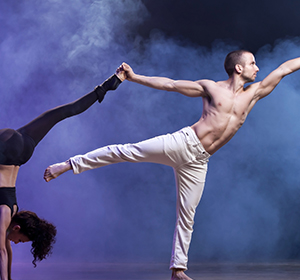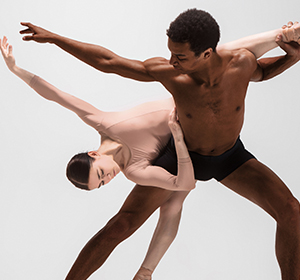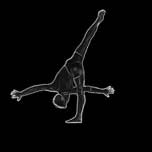Read a rare in-depth interview with the AD
Marisa Johnston a board member for Kenneth Walker Dance Project recently sat down with Kenneth to ask about his start as a choreographer and the start of the company. The result is this rare in-depth interview.
When you were young, were you surrounded by a family that embraced dance?
Kenneth: I think I was inadvertently surrounded by art when I was young. I come from a dancing family. They all danced at parties. Plus my aunts and uncles on my mom’s side were involved in local musical theater productions and we went to watch them. My family would take me to the Hollywood Bowl when I was young. I was surrounded by an appreciation for film and a wide-ranging enjoyment of music. From my parents, I got a diverse love of music, which shows up, in the type of dances we make for the company. From Bugs Bunny I got to hear classical music as a child.
How old were you when you decided you wanted to take dance lessons?
Kenneth: I think I was 11 or 12 when I started to dance. It was all unintentional. My cousin Kim was taking ballet and I would tease her about it. I think one day she had had enough and said something like , “If you think it’s so easy you come done and do it.” Not wanting to look like a wuss, I did.
Was there anything that held you back? Or made you doubt yourself?
Kenneth: In high school I didn’t take enough classes. I wanted what everyone my age wanted. I wanted to try different things like sports and going to dances and the like. So I would take the fall off and participate in a sport. At first it was football and then once I realized I wasn’t going to progress very far, I switched to cross-country. I was far more successful at that. I don’t recall possessing any doubts about pursuing dance, but I knew there were far more talented guys out there doing it. I had seen them at festivals and summer programs.
What inspired you to start choreographing?
Kenneth: The first pieces I choreographed were part of my classes at UCLA [Kenneth has a B.A. in World Arts & Cultures from UCLA]. I had wanted to do something before then but never got a chance. It didn’t seem like something that required me having to train in or study. I had seen so many people making dances it just seemed to be a natural thing to do. My first dances were duets and solos and not really dances but more like vignettes. My first group dance was for Pasadena Dance Theatre. I asked if I could make an “emerging” choreographer dance. The music was by Ravel. It was actually a project I started when I was studying for the summer at Pittsburgh Ballet Theater. I remember loving the genre-exploding movement of Gerald Arpino (co-founder of The Joffrey Ballet). That was back when the Joffrey had a second home in Los Angeles. I also saw of a lot of modern dance choreography, which inspired me when I started creating my own dances
What inspired you start your own company?
Kenneth: That was one of those crazy happenings that change the course of your life. I had been working as a freelance choreographer and I submitted to have my work performed at a festival. I received a call and they said they wanted me to bring my company. I, of course, covered the mouthpiece and said to my friend, “Dude we need to get together a company.” I told the caller, “Sure we would love to come!” Then I hung up and immediately started getting in touch with everyone I knew who might be available to see if they wanted to join in! As it turns out, the audience was so receptive we decided to try it in Los Angeles to see how we would fare. The following year we sold out our performances and we have been chasing that high ever since!
Do you model your career or your artistry or your path on anyone?
Kenneth: At this point in the arc of our company I don’t think we can say were are mimicking anyone. We are a single choreographer company but I don’t think any other single choreographer has the diverse repertoire we do. We’ve been called not contemporary enough, too pandering, etc. But there will always be critics. I’m committed and my dancers are committed to the style we have created.
This is what I know. We have a voice. We have dances of great emotional depth, we have dances that are just fluff but damn, they are fun and have a sense of humor that is not easily replicated in modern ballet! We have esoteric modern dances. We have dances that resonate with many and some that resonate with only a few but we are who we are and we are always trying to give the audience a damn good show.
Who or what told you “no?” at any point in your career?
Kenneth: “No” is something every dancer experiences. You hear “no” more than “yes.” Every audition is an opportunity to hear “no” and yet affirm to yourself that their “no” isn’t a statement against you. It is also a moment to assess what you are doing and to see if there is room for improvement. When I was working as just a freelancer, I would send out my reel to dozens of companies. More often than not I got no response. Sometimes I would get “you’re talented, but we can’t bring you in.” I even tried to get into those big choreography workshops that NYCB sponsored, but no dice. So while there some words of encouragement most voices were silent.
Did you have a mentor? Someone who told you or showed you that you could have what you want?
Kenneth: Yes and no. I always thought a mentor was someone who took you under their wing and showed you the ropes. No one did that for me. I did study how my directors managed people and their companies. I was studying for the day I’d have to do the same.
Ronn Guidi, the founder of Oakland Ballet was almost a mentor that way. He was someone who forged “a little company that could” in the shadow of San Francisco Ballet. He would advise me on how to treat the people that worked for me. He would dust off old choreography just for me and would almost treat me like an equal. I still send him videos of our choreography sometimes.
I talk to Mr. Alonzo King [founder of Alonzo King LINES Ballet] from time to time. He is not a touchy feely mentor. He challenges me. He has always challenged me. He pushes me to not stifle the dancers with my demands and to always be honest with the work.
In choosing to start KWDP and dedicate yourself to creating new ballets, what did you want to achieve?
Kenneth: I’ve made dances for individual dancers, I’ve made dances to music that I loved, I’ve made dances that I felt were an reflection of the emotional psyche of society. Throughout it all I’ve wanted to make dances that reflect my wide-ranging tastes that were distinct from each other, that either challenged the dancer or made them love dancing. That love of dancing is so important for dancers. Without it we feel stilted and without a voice.
Sorry, the comment form is closed at this time.





